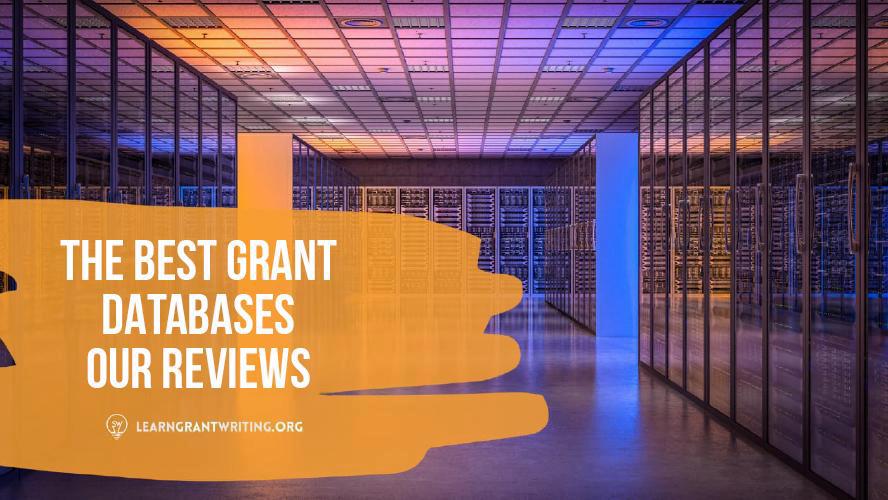The fastest way to find grant opportunities is to use a grant database.
There’s a time and place for Google, but using it for grant research can be a huge time-suck. A database can do in seconds what could take you days. Plus, it's a much easier way to organize your grant opportunities and keep track of them on platforms designed for the purpose.
There are several popular grant databases to choose from, but not all will align well with your organization’s unique needs. We’ve taken the time to test out several grant databases to give you a clear picture of the strengths and weaknesses of each.
In a hurry? Our top recommended grant research database is Instrumentl, so we’ve partnered with them to offer our grant writing community a special deal. Use the discount code LGW to get $50 off your first month.
Now, let’s dive into the top grant databases worth your time. Click on each database name to jump to the full review:
- Instrumentl (Our Top Pick)
- Foundation Directory Online (aka Candid)
- Grants.gov
- GrantStation
- Devex Pro Funding
- GrantScape
- The Catholic Funding Guide
- GrantForward
- Grant Gopher
- Pivot
- GrantSelect
- GrantWatch
Stick with us to the end for some expert grant research tips!
How Healthy Is Your Consulting Business?
Take our 4 minute consulting business test to quickly diagnose your sticking points and get you moving, with more joy and ease.
Take The Test
Instrumentl (Our Favorite Grant Search Database)
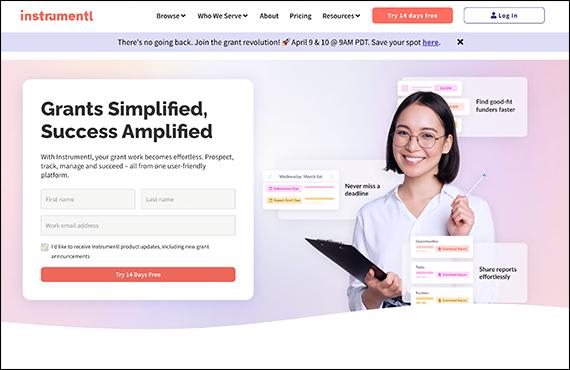
At Learn Grant Writing, we love Instrumentl! If you sign up for Instrumentl, use the discount code LGW to get $50 off your first month.
We’ve coordinated with the team behind Instrumentl and can assure you that they have your best interests in mind. Beyond that, the design is clear, the process is extremely user-friendly, and we personally love the deadline reminders (please tell us we’re not the only ones who need a kick in the pants every once in a while!).
Specific Features Include:
- Intelligent matching - access tailored matches of foundations and grant opportunities
- New match alerts - receive new matching opportunities in your inbox weekly
- 990's & foundation profiles - view in-depth foundation profiles and 990 data. Instrumentl actually reads and pulls the most relevant information from the 990 to easily display helpful data.
- Deadline tracking - receive automatic upcoming deadline reminders
- Reporting tools - share your progress with board members or staff
- Tasks - create and manage all your grant-related tasks in one place
- Document library - store and organize all your grant documents
- Organization tools - easily organize multiple prospect lists with the option to include notes on each prospect
- Diverse sources - explore grants sourced from corporate funders, federal governments, state governments, private foundations, community foundations, and clubs and societies
Instrumentl’s pricing can be found here. Plans start at $179/monthly. Higher-tier plans, which support more projects in your account, are also available.
We understand grant databases can be a chunk of change, but for the superb tracking system and all the other relevant tools, Instrumentl is the best database we’ve found for its value and full suite of additional features. Plus, members of the Global Grant Writers Collective get an exclusive deal on pricing!
👉 After your free trial, if you end up liking the tools as much as we do, use the discount code LGW to get $50 off your first month of Instrumentl.
How Does Instrumentl Compare to Other Grant Tools Out There?
Instrumentl is the leading institutional fundraising platform that brings grant prospecting, tracking, and management to one place. For context, most other grant tools are only capable of doing one or two of these three components.
One of the strongest aspects of this platform is that you can learn how to use it in under an hour. The same cannot be said for other prominent alternatives. Nonprofits and grant writing consultants often choose Instrumentl for its superior user experience and intuitive data insights, along with its all-in-one grants functionality.
Take a look at our partner webinar with Instrumentl for a sneak peek at its features:
If you’re on the fence comparing a few grant database providers, the Instrumentl team has created helpful product comparison pages to other commonly used grant tools.
Working as a nonprofit grant writer? Want to write fewer proposals and win more funding? We built this training just for you. Check it out!
Foundation Directory Online (aka Candid)
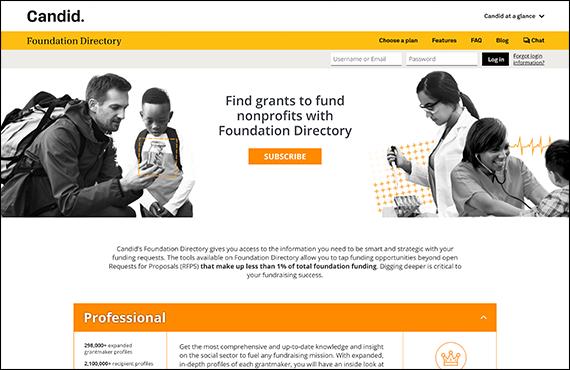
Foundation Directory Online (FDO) from Candid is one of the most well-known legacy grant databases in the nonprofit field.
For a quick peek into the database and what to expect from the platform’s features, check out a professional sample funder profile and sample grant search.
FDO offers three different subscription levels: Essential (starting at $35.54/month), Professional (starting at $126.58/month), and Enterprise for very large organizations (request a custom quote). Funder profiles are offered along with recipient profiles (for Professional tier members) and Private Foundation 990s, when available.
With over 225,000+ expanded grant-maker profiles available with FDO Professional and 108,000+ expanded profiles with FDO Essential, Foundational Directory Online is a reliable legacy option for a grant database that offers tons of helpful information.
Grants.gov
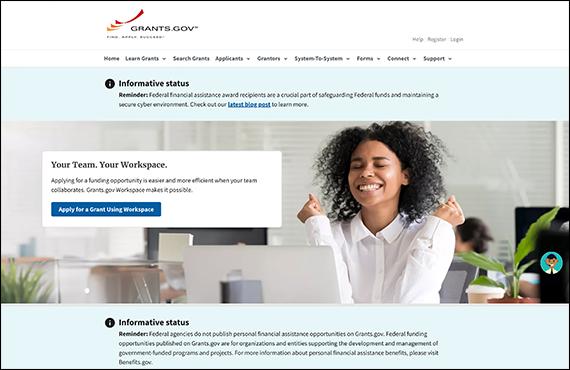
Grants.gov is the official source of truth for all things federal grants, and it’s completely free to use.
This federal service provides a comprehensive, up-to-date database of all federal grant opportunities as well as a trove of additional educational resources and form libraries. It offers collaborative grant Workspaces to help your team better organize its projects and submit proposals, available in different configurations depending on the scope of your efforts and the number of registered users.
As with many large-scale online government platforms or portals, though, the overall usability and intuitiveness of the grant search functions in the database lag behind those of many paid platforms. However, it does provide a full range of filter functionalities that get the job done plus plenty of guidance for learning how to use the site.
As a free, comprehensive, and trustworthy resource on federal grant opportunities, every nonprofit needs at least a cursory understanding of how to use Grants.gov. Master this platform, federal grant lingo, and the complex federal grant application and management processes, and you’ll have an invaluable grant seeking skillset.
GrantStation
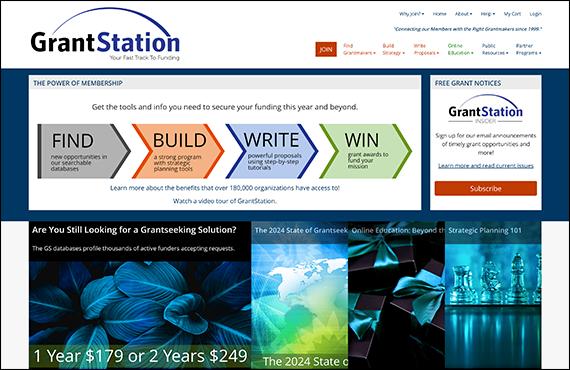
GrantStation offers nonprofit organizations, educational institutions, and government agencies the opportunity to identify potential funding sources for their programs or projects as well as resources to mentor these organizations through the grant-seeking process. The grant database is only one of the services provided by the organization.
GrantStation features grants from:
- Government sources
- Private, corporate, and community foundations
- Corporate contribution programs
- Faith-based funders
- Association grant programs
Federal grants are pulled from Grants.gov and for those in Canada, GrantStation provides a page for each province listing the agencies with grant programs.
Funding agency profiles are available with detailed primary contact information, current funding priorities, geographic scope, grant guidelines, application deadlines, and notes that provide "insider" information on selected funders.
Full membership access allows members the opportunity to utilize all the online grant-seeking tools they offer, including the GrantStation grant database. The full membership is a bit pricey, though, ranging from $699 (one year) to $1,782 (a better deal for three years).
We appreciate that this database considers Canadians, as we know that many of our grant writing students are from Canada or work with Canadian organizations. However, the database is still a bit clunky to use and doesn’t have a great tracking system for saving grants or setting deadlines and reminders.
Pro Tip: A 1-year subscription ($110) to The Chronicle of Philanthropy will give you access to GrantStation’s grant database!
Devex Pro Funding
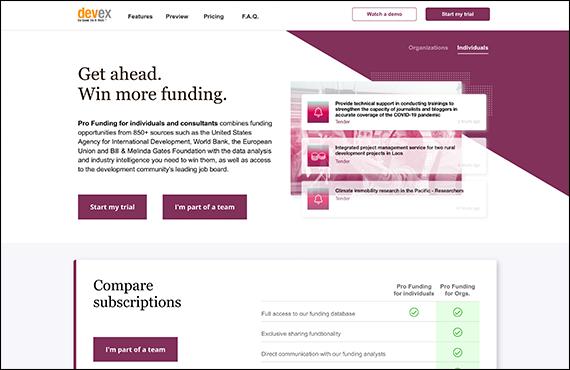
Devex is a media platform and resource hub devoted to the global development and international philanthropy fields, and it offers its own database and search platform, Devex Pro Funding.
Compiling grant opportunities from over 800 funders worldwide, this platform offers a standard range of search and organization features. One standout feature involves forecast analyses, which help you identify potential grant opportunities through projections of funding activity based on funders’ past grant awards.
It’s a specialized platform for organizations and consultants that work in global development—if this is you, Devex might be a wise investment. Take a behind-the-scenes look at Devex Pro and how one of our coaches uses the site to source international funding here.
Individual subscriptions start at $83 a month. For organizations, contact Devex for custom pricing. Discounts may also be available for small nonprofits, students, and organizations in low- and middle-income countries.
GrantScape
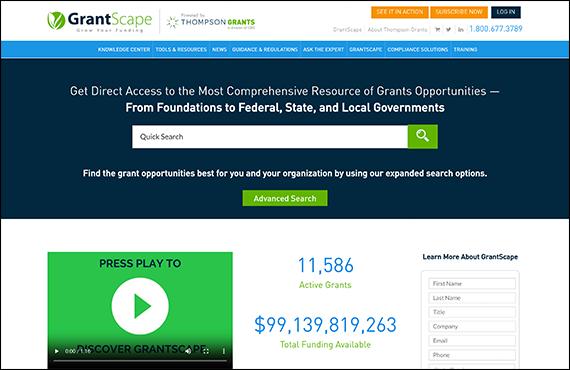
GrantScape offers U.S. federal, state, local, and foundation grant sources. There are over 180,000 grantors and over 11,300 available grants currently housed within the database.
The core database provides robust search and filter functions, funder profiles with updated contact details, and helpful dashboards for saving grant opportunities and setting up reminders. While they don't have a free trial for their grant database, they do offer a free trial on their post-funding resources, including the Grants Compliance Expert.
Individual memberships start at $30/month, with more comprehensive packages available for grant writing consultants ($102/month) and enterprise-level organizations (request a quote).
Overall, we found GrantScape to be a reasonably affordable option and we like the resources available within the dashboard function. If you'd like more information, here’s a 30-minute demo of the database.
The Catholic Funding Guide
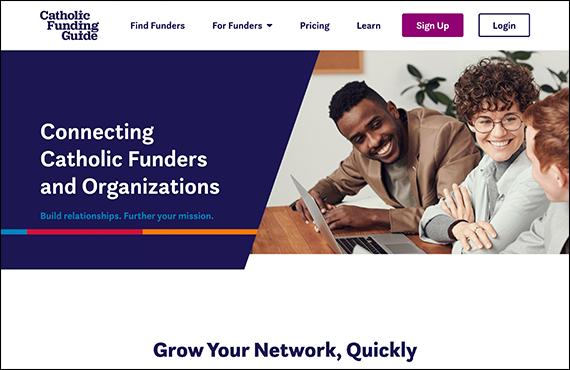
A few of our Learn Grant Writing students use the Catholic Funding Guide but mentioned the database leaves much to be desired.
The search functionality is pretty basic, although the system does offer funder profiles. This database is fairly limited in terms of the type of funding it hosts. Most of the grants fall within a range of grantmaking sources including faith-based agencies, such as those under the sponsorship of the U.S. Bishops, religious orders, the Vatican, Catholic healthcare systems, fraternal groups, and international Catholic funding agencies.
You can get a one-year standard subscription for $229 or a professional plan for $299.
Overall, we found the database to be a bit outdated in terms of design and limited in regard to tools within the system and ease of operation for the user. However, for organizations that would benefit from the specific focus of this grant database, it may help you save time and quickly narrow down your search to the most relevant funders.
Grant Forward
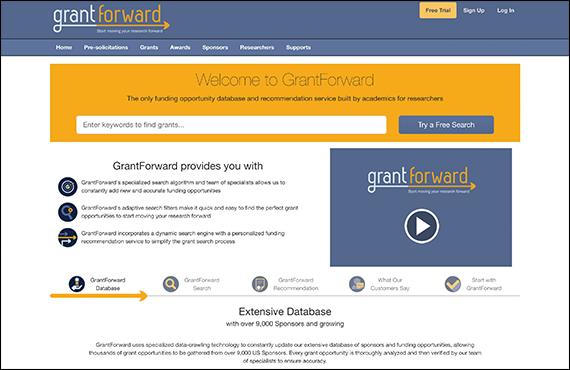
190,000+ grants exist within the GrantForward database. This database covers the whole ecosystem of funding including grants, sponsors, pre-solicitations, and the funded awards. Notably, it focuses on academic grant seeking.
Subscribers can also receive an early heads-up when opportunities are being prepared, and are informed of what projects, topics, and organizations get funded. Additional features of GrantForward include:
- The option to exclude grants from searches
- View history to easily retrieve opportunities
- Filter include/exclude enhancements
- The ability to edit publications in researcher profiles
- Keyword search options for profiles
The subscription cost per year varies and is determined both by funding size and the population of your organization (students and employees), although it is generally on the higher side.
We liked the extra features of GrantForward and the simplistic, easy-to-use layout, although we still felt it was a bit pricey for what subscribers receive. However, its specialized focus and features for academic grant seeking could make it a strong contender for some organizations.
Grant Gopher
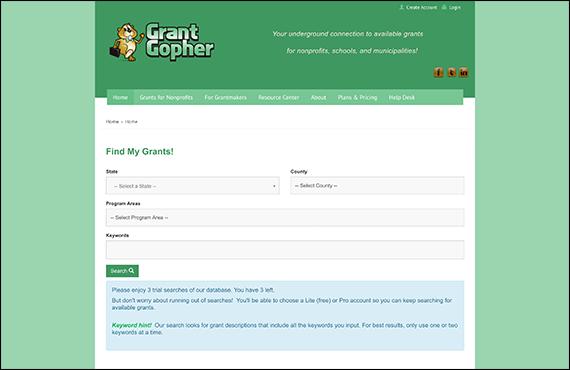
Grant Gopher is a well-known grant research resource for U.S.-based nonprofits. It was born out of a real need for accessible research platforms that cut through the clutter and help small, grassroots organizations like schools and clubs find much-needed funding without jumping through endless hoops.
The platform provides a simple but effective search functionality plus a library of grant seeking resources and tools tailored to smaller nonprofits. The paid plan comes with alerts, notifications, additional search options, and a helpful calendar tool.
Grant Gopher’s goal of accessibility is still reflected in the platform’s pricing today—a free, limited-functionality plan and a Pro plan with extra features and notifications for just $9/month. Grant Gopher also offers a special program called Pro Success Path for a limited number of registrants that provides monthly in-kind research services, giving small organizations an even bigger leg-up on their grant seeking competition.
For many types of small organizations, particularly schools, the price point and easy-to-use nature of Grant Gopher can’t be beaten.
Pivot
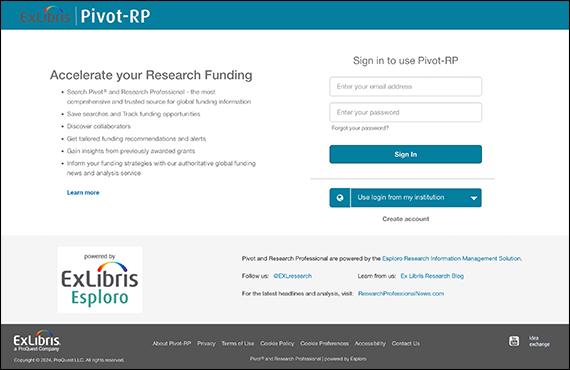
Pivot is a grant database designed specifically for researchers. Anyone from corporate to academia (faculty, staff researchers, and graduate students) can benefit from using it. However, you must be affiliated with an institution that subscribes to Pivot to create an account.
Subscribers can search for a funding opportunity and instantly view matching faculty from inside or outside their institution. Conversely, a search for a scholar will link to matching funding opportunities.
Pivot also enables you to add internal deadlines for critical funding opportunities and sends weekly updates on saved searches. Additionally, subscribers can receive alerts whenever new matching opportunities are posted that match their saved searches and create groups for sharing funding opportunities on an ongoing basis.
Pivot is only available to professionals whose affiliated institution subscribes to the database, which is fairly limiting. To help with learning the system, their YouTube channel is packed with useful tutorials.
GrantSelect
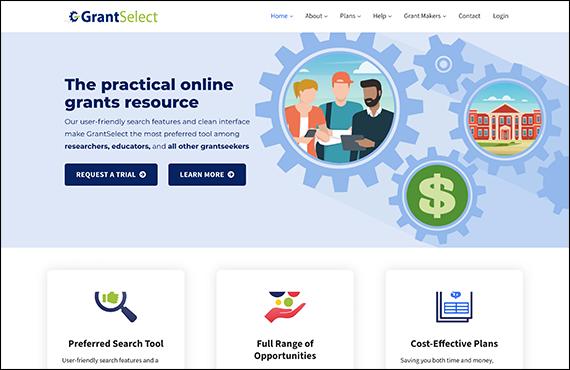
The GrantSelect database provides detailed grant records, including contact information, sponsor name and address, subject terms for related searches, and type of sponsor (federal agency, foundation, research institute, etc.). When available, the records also include:
- Deadline date(s)
- Restrictions on who may apply
- Lists of previous awards and amount(s)
- Catalog of Federal Domestic Assistance (CFDA) number
- Populations encouraged to apply (e.g., women, minorities, disabled)
- RFA and PA numbers for NIH grants
- Program numbers for NSF grants
GrantSelect offers three different subscription options depending on how long you wish to subscribe and whether it’s an individual or institutional subscription. Individual subscriptions have two options, including Standard at $150 per month and Professional at $495 annually. If you’re interested in an Institution subscription, contact them for a quote.
Note that the free trial subscriptions are open only to faculty, staff, and administrators at academic institutions or libraries. To request a trial, contact the sales staff, who will discuss terms, provide a quote, and send you access information.
As a whole, GrantSelect is a fairly robust grant database and could be a smart choice for academic organizations and libraries. We appreciate when the company can include all of the extra bits of information to compose a complete grant record—these extra tidbits can make a big difference in your grant seeking efforts.
GrantWatch
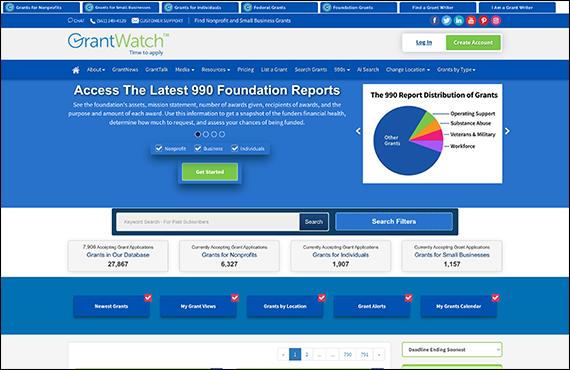
GrantWatch is one of the more affordable grant databases we reviewed. Prices are $18/week, $45/month, $90/quarter, or $199/annual.
Within the database, grants include foundation, corporate, state, city, and federal funding sources. Over 27,000 grants are available in GrantWatch for nonprofits, small businesses, and individuals.
GrantWatch provides detailed information such as:
- Eligibility and geographic focus
- Pre-application and workshop information
- Description of the grant program
- Funding amounts
- Number of awards
- Funding source
- Contact details
- Links to grant applications
While the information subscribers have access to within each grant record is extremely helpful, the trickiest part for us was finding relevant grants. The platform’s search and filter functionalities are fairly limited, which can complicate and slow down your research process.
All in all, GrantWatch might be more affordable, but subscribers are missing out on quality features and helpful functionality in finding applicable grants.
Working as a nonprofit grant writer?
Want to write fewer proposals and win more funding?
We built this training just for you. Check it out!
Expert Tips for Navigating Grant Research
Once you’ve chosen your ideal grant database, it’s time to start researching!
We’ve got a few expert grant research tips to share:
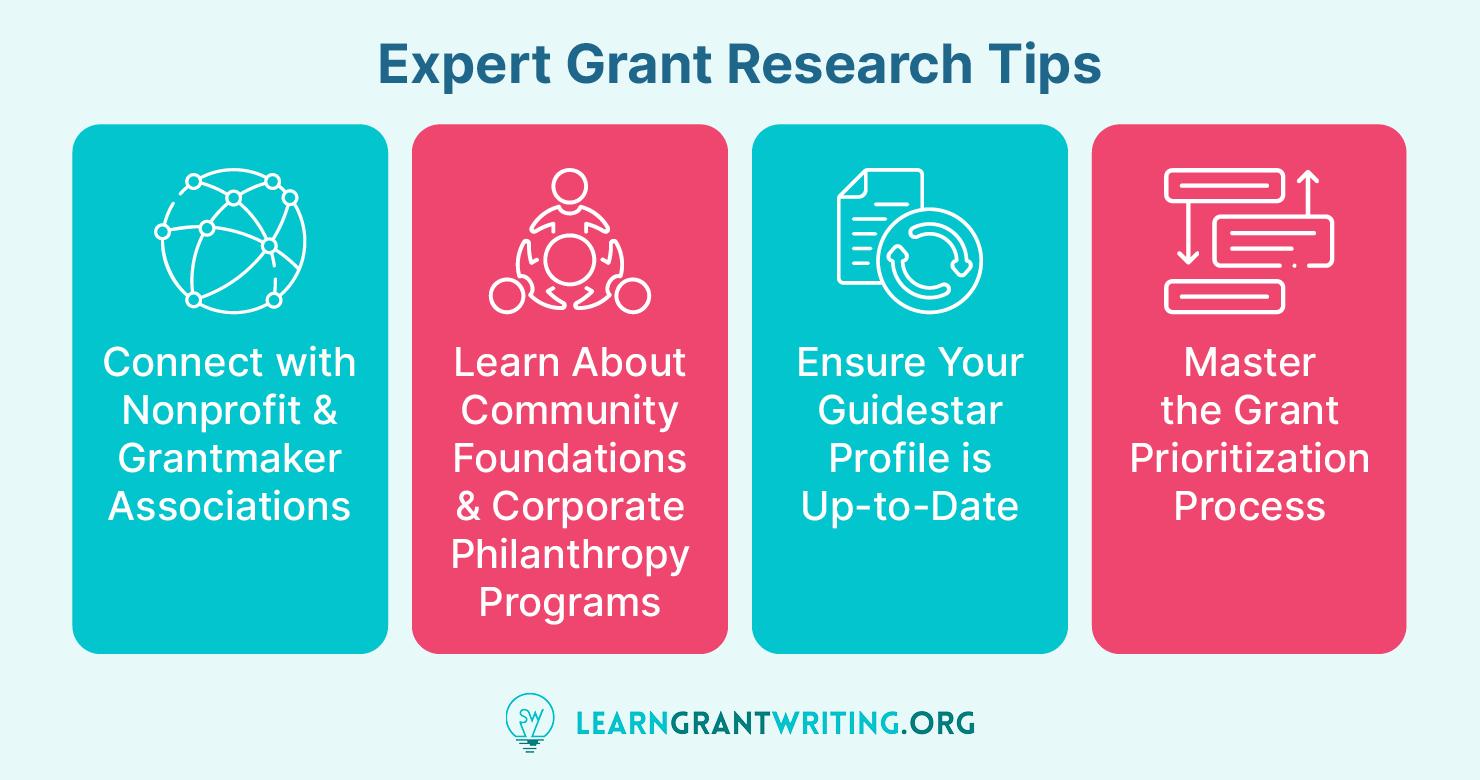
⭐ Connect with Nonprofit and Grantmaker Associations.
You’re not in it alone! There are tons of associations at the local, state, and regional levels that bring together resources and expertise for nonprofits.
Nonprofit associations can offer training and education to support your grant program, and some even provide their own mini-databases of localized grant opportunities that are worth exploring. Associations of foundations frequently offer similarly helpful resources.
A quick Google search for relevant associations in your state or region can get you started. The National Council of Nonprofits’ directory of state branches is another good starting point. For foundations, try United Philanthropy Forums’ list of members broken down by state.
⭐ Learn About Community Foundations and Corporate Philanthropy Programs.
Don’t limit your grant research to just the big names or private foundations. Smaller community foundations and corporate philanthropy programs are extremely viable funding sources that often go overlooked.
Plus, these relationships can be both actively and passively beneficial for your nonprofit. Let us explain:
- Community foundations offer grants just like other types of foundations, but they also frequently sponsor donor-advised funds (DAFs), which are like philanthropic savings accounts for donors to disburse gifts to nonprofits over time. DAFs have quickly become a major part of the philanthropic landscape, but these opportunities can be hard to find. Get to know your local community foundations and ask about their DAF programs. If you can build relationships with the right donors, DAF grants via community foundations can become a reliable (and lucrative) stream of revenue for your organization.
- Corporate philanthropy programs also regularly offer grants to nonprofits, but they may be off your radar if you don’t know where to look. Learn more about your local, state, and regional business environment, and try researching your donors’ employers. Tap into the passive value of these programs by specifically looking for matching gift programs. These employer-sponsored benefits match the donations made by employees to eligible nonprofits, effectively doubling the value of their gifts. There are tools and databases built specifically for this niche if you’d like to invest further.
⭐ Ensure Your Guidestar Profile is Up-to-Date.
Guidestar (now part of the larger Candid brand) is the industry-standard source of truth for learning about nonprofits, their governance structures, and past financial filings like Form 990s. As such, funders of all sizes, DAF sponsoring organizations, and even some donors rely on it to help make their philanthropic decisions.
This is an extremely important public-facing source of information about your nonprofit, but it can also be easily neglected in the hubbub of your daily work.
Regularly take the time to review and update your nonprofit’s profile—it’s worth the effort!
⭐ Master the Grant Prioritization Process.
You can’t go after every grant opportunity you find. Not only will this waste your time, but it might also make your proposals less effective since you’ll have to rush through them.
Understanding how to prioritize the grant opportunities you find is critical, and it will help ensure your efforts yield a positive return over time.
Always start your grant research by finding opportunities that match your mission, proposed program, and timeframe. When you have a solid list of options, cut it down further by looking closely at these criteria:
- Alignment. Your shortlist should already be pretty well-aligned with your mission and needs but go further by looking at the funders’ past funded projects. Does your proposed project or program sound like it’s in the same ballpark as those that the funder has a proven record of supporting in the past? Does your plan closely align with the grant’s stated purpose and guidelines?
- Competitiveness. How likely is your organization to receive this grant? Consider the value and specificity of the grant as well as the funder’s prominence. Try to roughly gauge how much attention this grant is likely to get. Even if you can tell you’ll be up against a lot of other nonprofits, taking a shot can still be worth it. However, this exercise helps you recognize the challenges and build more effective backup plans if needed. It can also help you know when to prioritize grants that might be less valuable but offer a very high chance of success.
Many of these skills come with experience, but they’re also learnable!
Don’t forget to seek out additional grant writing, research, and management training if you need extra support or want to hear directly from an expert. Online grant writing courses can help, and they’re especially valuable when paired with online communities like The Global Grant Writers Collective—check it out!
Free Grant Writing Class
Learn the 7-steps to write a winning grant application and amplify the impact you have on your community.
Access Free Class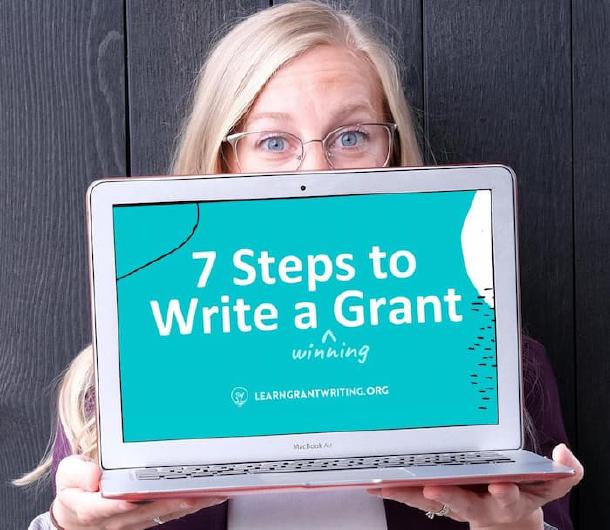
Our Ultimate Grant Database Recommendation
We know that you need to do what is best for you, but we can’t help but offer a glowing recommendation of Instrumentl.
We have used lots of other databases and found them to be clunky and generally more expensive than Instrumentl. We could spend even more time and detail explaining our history of examining other databases, but much of the value we offer you is having filtered through those resources to land on what we think is the best resource for nonprofits. We think your best bet is Instrumentl.
Which grant database do you use? Would you recommend it to other grant writers? Why or why not? Let us know!
If you haven't already, be sure to follow us on Instagram for new updates, or keep learning with these additional resources from the Learn Grant Writing team:
Discover Grant Writing as a Career
If you’re interested in becoming a grant writing consultant, check out this free training on how you can pull off a meaningful career change.
Access Free Class
